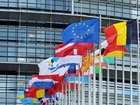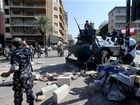Lebanese protesters faced off with security forces Thursday as they tried to block reopened roads and prevent their unprecedented non-sectarian push for radical reform from petering out.
The resignation of Prime Minister Saad Hariri's government on Tuesday had been met with cheers from the crowds seeking the removal of a political class seen as corrupt, incompetent and sectarian.
 Full Story
Full Story
Lebanese banks have been closed for the last two weeks as the government grapples with mass demonstrations that have paralyzed the country, but an even greater crisis may set in when they reopen Friday.
There are concerns the government may not have enough foreign reserves to defend its flagging currency, service its massive debt, and maintain the import of vital goods, particularly if there is a run on the banks.
 Full Story
Full Story
Mass anti-corruption demonstrations continued Wednesday in the northern city of Tripoli and the southern city of Sidon, hours after blocked roads were re-opened across Lebanon in the wake of the government’s resignation.
Some protesters in Tripoli’s al-Nour Square called for the fall of the president, the parliament speaker and the members of parliament. MTV meanwhile said that some roads will be blocked at night in the city.
 Full Story
Full Story
The resignation of Lebanon's government marks a new phase in the unprecedented two-week-old protests against corruption and sectarianism that have gripped the country.
It was welcomed as a victory by the protesters -- but can it really be classified as one?
 Full Story
Full Story
Lebanese Forces leader Samir Geagea on Wednesday announced that the 2016 political settlement that led to the election of President Michel Aoun “has definitely fallen,” as he noted that caretaker Prime Minister Saad Hariri is the LF’s “first choice” for heading a new “non-political” government.
“What’s needed is a salvation government that would be free of the traditional faces who have served in successive governments since years -- a government that truly comprises independent men,” Geagea said in an interview with the Central News Agency.
 Full Story
Full Story
The Delegation of the European Union and the EU Heads of Mission in Lebanon on Wednesday called for a speedy government formation process in the wake of Saad Hariri’s resignation.
In a statement, they acknowledged that “Lebanon's citizens have taken to the streets and expressed their disillusionment with the political situation in the country.”
 Full Story
Full Story
The United States and six Gulf allies announced sanctions Wednesday on 25 entities allegedly associated with Iran's Islamic Revolutionary Guard Corps and Lebanon's Hizbullah, in a move to tighten controls on both group's finances.
The sanctions were set by the Riyadh-based Terrorist Financing Targeting Center, a two-year-old group that includes Saudi Arabia, Bahrain, Kuwait, Oman, Qatar and the United Arab Emirates in addition to the United States.
 Full Story
Full Story
Education Minister Akram Shehayyeb on Wednesday called on all public and private schools, universities and institutes to resume classes on Thursday.
In a statement, the minister said the decision was taken “following the Lebanese Army’s move to reopen roads in the various Lebanese regions, and after holding consultations with the various sectors and the meeting that was held at the ministry today, Wednesday with the associations of public school teachers.”
 Full Story
Full Story
President Michel Aoun on Wednesday announced that Lebanon will have a “clean government,” a day after Saad Hariri bowed to unprecedented anti-graft street protests and submitted his government’s resignation.
“Lebanon will have a clean government and the protests that happened have opened the door to major reform,” Aoun told a delegation from the Maronite League during a meeting in Baabda.
 Full Story
Full Story
The resignation of Lebanon's government under pressure from the street looked set to ease a two-week-old nationwide lockdown but protesters vowed they would keep pushing for deeper change.
 Full Story
Full Story



